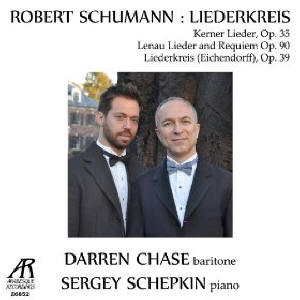You are reading the older HTML site
Positive Feedback ISSUE 75
Darren Chase Sings Schumann
Lieder
SCHUMANN: Kerner Lieder, Op. 35; Lenau Lieder und Requiem, Op. 90; Liederkreis, Op. 39. Darren Chase, baritone; Sergey Schepkin, piano. Arabesque Recordings Z6852 (download only). TT: 79.12. Darren Chase's Schumann program has a great deal to offer. The baritone has a firm, compact voice that takes on a brighter colour as it ascends. The head voice functions well enough to allow him to access an open, proclamatory tone across a range of dynamics, as well as to scale down to a nice, supported mezza voce in Wanderung, the opening of Erstes Grün, and the third and fourth strophes of Die Sennin. Musically, his intonation is impeccable, and his rhythmic address, even in the more ruminative songs, is trenchant and alert. Chase's forthright interpretive instincts are a welcome change from the sort of preciousness sometimes heard in this repertoire. His basic stance is extrovert: not externalized by any means, but adopting a presentational demeanor more readily associated with the opera stage than the recital platform. The Opus 39 Liederkreis, many songs of which benefit from directness and urgency, is thus the most successful of these performances. That's not to dismiss Chase's readings of the simpler narrative songs, however, where his natural-sounding inflection of German—unencumbered by the affected "closed" vowels beloved in the universities—produces a conversational immediacy. In songs such as Einsamkeit, from the Lenau group, the singer conveys spiritual unease without compromising the vocal line. He projects the ambiguous balance of joy and spiritual pain in Requiem as surely as the quiet affirmation of Auf das Trinkglas eines verstorbenen Freundes, or the mournful dignity of the first In der Fremde in the Liederkreis. The end of Im Walde is marked by a simple, effective color change. Some mild vocal snags remain to be worked out. Upward excursions, where tenorish overtones mix into Chase's basic baritonal timbre, aren't all handled elegantly. There are a few distracting lunges in Lust der Sturmnacht, the very first song in the program; the leap to "voll" in Frage is strenuous; in Stille Tränen, "Schmerz" is a self-conscious wail. Chase strains a bit in parts of Die Sennin—is he singing this in a tenor key? And the falsetto passages that depict the maiden's prayers in "Stirb, Lieb' und Freud", while accomplished, verge on parody. On the other hand, the the low bits of Auf das Trinkglas are weak, and it's hard for Chase to sustain a true legato in the low tessitura of Lied eines Schmiedes. In many numbers, after the singer finishes, Schumann continues the narrator's thoughts in extended piano postludes: Sergey Schepkin colors and weights these passages impeccably, save for the fitful rubato in the postlude of Intermezzo. Elsewhere, he supports Chase with a lovely solid tone -- the Lied eines Schmiedes suggests "smithing," without clangor—and a wonderful flexibility, avoiding wilting sentimentality in the "weak" chromatic passages. The program is only available in digital downloads, though I reviewed it from a private CD transfer. Unfortunately, no lossless formats are available. Amazon offers plausible mp3s at 262 Kbps; iTunes offers .aac files, its default format, at 256 Kbps. The Arabesque Records website offers downloadable texts. Stephen Francis Vasta is a New York-based conductor, coach, and journalist.
|


